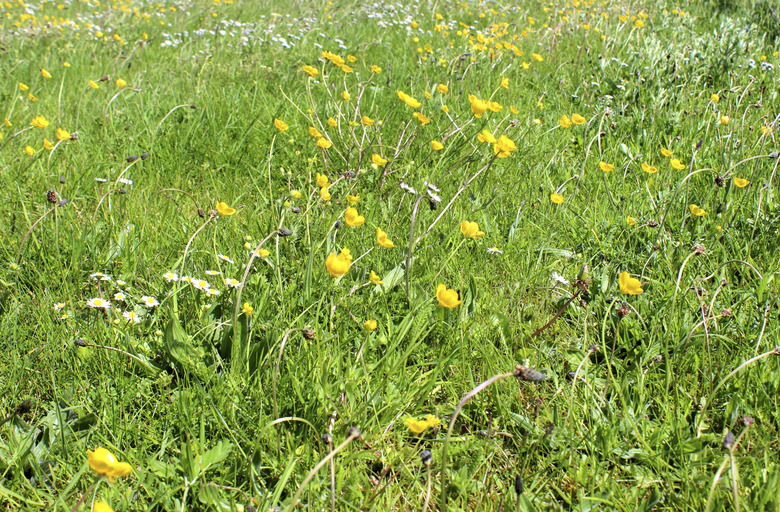How To Calculate Plant Density
Plant density — the number of plants of a certain species in a particular area — is determined by counting the number of individual plants of a species in uniformly sized sample plots within a site. The size of the sample plots depends on the size of the plants being measured. Researchers frequently use a quadrat frame to define sample plots. Plant density is used to help determine the percentage of germination in a field, the number of invasive weeds present to assess control measures and to track plant population changes over time.
Preparing to Measure
Preparing to Measure
Based on your needs for your plant density project, select a study area. It may be one area of a garden for example. Mark the boundaries of the study area with stakes and twine. Because seedlings often look different from older plants, ensure you can correctly identify the kind of plant you want to count. Decide how many plots will adequately sample the area. A sample plot should hold four to 10 plants per plot of the plant type being studied. Small plants generally need 1- to 3-square-foot sample plots, and larger plants such as shrubs and trees need 12- to 300-square-foot plots. Experiment with which plot sizes to use, customizing them if necessary to the plant you'll count.
Selecting a Sample Plot Size
Selecting a Sample Plot Size
Quadrat frames are uniform sizes and simple to move, making them useful for small sample plots. A 1-square-foot quadrat frame is suitable when counting small plants. Use either a 3-square-foot or rectangular 1-by-3-foot quadrat frame for counting larger plants, such as low-growing herbs. If you have large sample plots, such as those suitable when counting sizable shrubs and trees, then use a tape measure, string and stakes to mark out square sample plots within the study site. Whether you will use the quadrat frame method or the string-and-stakes method to establish sample plots, either choose the sample plots randomly throughout the study area or create a grid over the study area and place a sample plot in one corner of each grid unit.
Constructing a Quadrat Frame
Constructing a Quadrat Frame
You can use the same quadrat frame throughout the study area. After deciding on the quadrat size, cut 1/2-inch-diameter Schedule 40 polyvinyl chloride pipe into four pieces of the proper length, using a hacksaw for the task. For example, two 1-foot PVC pipe pieces and two 3-foot pieces will create a 1-by-3-foot rectangular frame, or four 1-foot-long pieces will create a 1-square-foot frame. After arranging the pipe pieces to form a square or rectangular frame, put 1/2-inch-diameter PVC elbow joints at each corner of the frame. Insert the pipe ends completely into the elbow joints to make the frame. If desired, use PVC glue to attach each pipe to one of its elbow joints so you can work with the quadrat frame without losing the elbows.
Determining Density
Determining Density
When you're ready to begin counting your chosen plant species to calculate its density, go to the first sample plot site, give it an identifying name or number and write that identifier on paper. The quadrant frame needs to rest flat on the ground, and so working it gently through vegetation may be necessary. Count the number of plants of your chosen plant species that are rooted inside the quadrat frame. Next to the sample plot's identifying name or number on your paper, write the number of plants you counted within that plot. That number is the chosen plant's density in the sample plot. Repeat this counting and recording procedure for each sample plot within the study area.
Calculating the plant's average density in the study area requires adding the density figures for each sample plot to get the total number of plants counted. Divide the total number by the number of sample plots.
References
- Cornell University, Environmental Inquiry: Plot Sampling — Density
- Oregon State University: Botany 440 — 3. How to Measure: Measuring Vegetation Characteristics Per Area
- University of Idaho: REM357 — Density
- Cornell University, Environmental Inquiry: Locating Sample Plots — Random and Stratified Sampling
Cite This Article
MLA
Csanyi, Carolyn. "How To Calculate Plant Density" sciencing.com, https://www.sciencing.com/how-to-calculate-plant-density-12251545/. 21 July 2017.
APA
Csanyi, Carolyn. (2017, July 21). How To Calculate Plant Density. sciencing.com. Retrieved from https://www.sciencing.com/how-to-calculate-plant-density-12251545/
Chicago
Csanyi, Carolyn. How To Calculate Plant Density last modified March 24, 2022. https://www.sciencing.com/how-to-calculate-plant-density-12251545/
